The first thing I noticed, climbing down the steep steps of the plane onto the tarmac in the tropical heat, was the smell.
Hawaii & Rarotonga smell of warmth, and flowers, and faintly, in the background, the clean, salty tang of the ocean.
Vanuatu smelled of smoke. It hung in the air, and caught in my lungs: burning vegetation and wood. Flying over the island, or looking out over the island from any height, you could see the plumes and haze. Small cooking fires, and larger patches of burning forest.
The next thing I noticed was the beauty. Lush green hills, endless coconut plantations, a city centred on one of the most stunning natural harbours in the world, dotted with miniature islands and fringed with white sand beaches.
The final thing I noticed was the poverty. I’ve never been to a third world country before, and Vanuatu is properly third world. Most people live in shacks cobbled together from tin and cement, or wood and grass (well, technically palm fronds). Huge portions of the population depend on subsistence agriculture: they eat what they grow, and if crops are poor, they don’t eat.
But yet, grass shacks aside, looking at the people, I don’t think that my life is really measurably better than theirs, or that Vanuatuan society would be much improved by the introduction of much in the way of first world standards.
I grew up poor in the subtropics. No electricity and outhouses poor. So I’m not just romanticising poverty. To an extent, I know what I’m talking about. Being poor in the tropics, when you don’t need a lot of clothes, and can grow your own food, is not like being poor where it is cold in the city. Where you have a society that supports each other, where people step in for childcare, and when someone is sick, and for big projects, you need even less.
Vanuatu does need a better medical system, so there is less malaria. And women’s rights should be advanced a great deal. More education, with every child having access to school. And I’m sure the dogs and cats would like it if flea treatments were a bit more common.
But other than that? Life is much simpler in a place like Vanuatu, and there is a huge benefit to that simplicity.
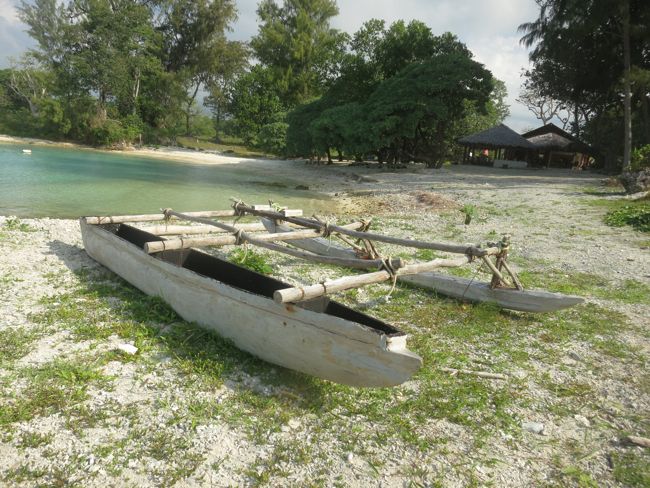 A traditional outrigger, in front of a rural restaurant
A traditional outrigger, in front of a rural restaurant
No, I don’t pity the Ni-Vanuatu. We have a lot in the West, with our carefully decorated houses, and large screen TVs, our dozens of pairs of shoes, and new model cars, but we gave up a lot as well.
The proximity of wealth to poverty did make me uncomfortable though, and worried me. The beautiful resort we stayed at: all immaculate private fare set amongst manicured forests, on a stunning white sand beach, was surrounded by humble local houses. And the children of those houses couldn’t use our beach, because the resort was adults only, and the lease on the resort had a clause prohibiting children on the beach. On the bright side, most land is forever owned by the locals, and only used on 75 year leases.
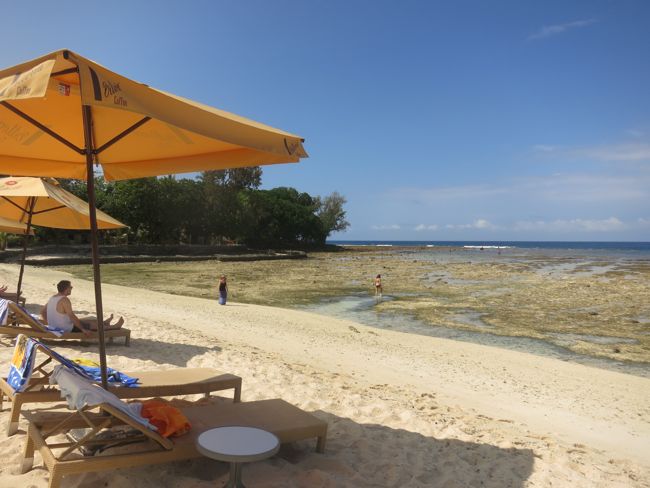 The resort beach at super low tide, with the seabed exposed.
The resort beach at super low tide, with the seabed exposed.
What must the locals think of us? An endless stream of foreigners (mainly from Australia) lazing about on the beaches, drinking $10 cocktails, buying trinkets at the market, leaving meals of expensive imported ingredients or local delicacies half eaten, and watching shows of ‘kastom’ dances at night?
On the one hand, tourism is a mainstay of Vanuatu’s economy. Our visit brought in much needed foreign dollars: absolutely vital in a place that imports far more than it can export. As long as it isn’t siphoned away by corrupt government officials, our dollars would help send children to school, and build roads, and buy dinners.
On the other hand, how much are we changing Vanuatuan society? Bringing in foreign ideas and expectations that may not always be beneficial.
One of the activities the resort offered was a ‘cultural tour’ of the local village. I was really pleased that it was just a walk around the local houses, led by a local man that actually lives in the village, and that (save for a little performance that was mostly ‘If You’re Happy and You Know It at the preschool) there was no song and dance or special ‘lets pretend to show our customs’ for us.
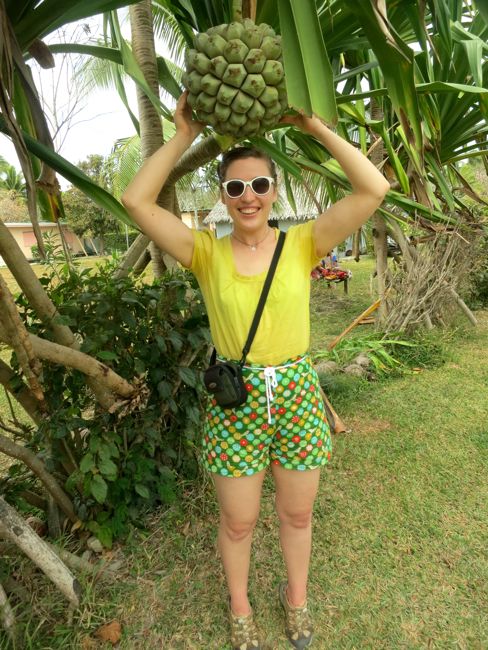 On the tour, with a giant pandanus fruit
On the tour, with a giant pandanus fruit
At the same time, some tourists on the tour took candy with them to give the kids, and I wondered: if tourists are going through twice a week, giving away lollies to children, how quickly is that going to change children’s diets and expectations? It seems a fun kindness at the time, but how much does it take to tip the balance from a diet and lifestyle that have served the Ni Vanuatuans for hundreds of years? We didn’t see a single overweight Ni Vanuatu in 8 days, but how long will that last?
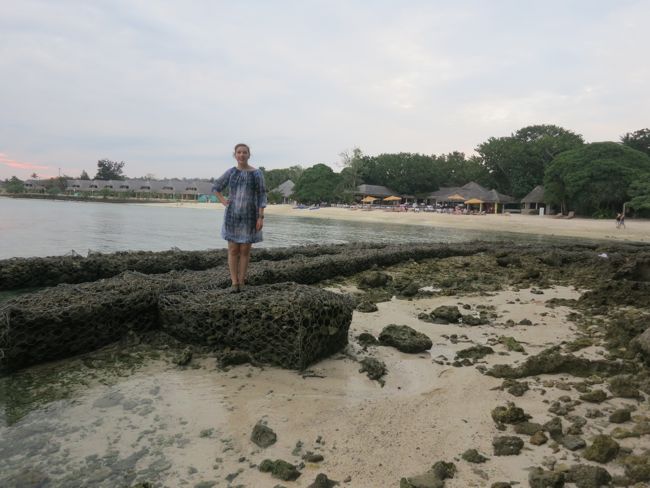 On the seawall in front of the resort at sunset
On the seawall in front of the resort at sunset
One of the really lovely things about Vanuatu was how safe it was. I felt completely comfortable riding the buses (more on those later) by myself, and most crime is very rare (we were told that crime was mostly ‘leave two pairs of shoes outside your door, you might wake up and find only one left (because obviously you had more than you needed), but it would be the better pair’) (the exception to the lack of crime, sadly, is family violence, which is a crime as far as I’m concerned, and is problem: see my comment on the status of women). It’s also a nice place to be a tourist: there is no begging, no cries of ‘buy this’ in the market, no up-pricing for tourists (even where I thought there should have been), no tipping even: those are all against Melanesian culture.
But already tourism has caused a change. Some bus drivers will give you the hard sell on taking day tours with them, and that’s a new thing, and not a nice change.
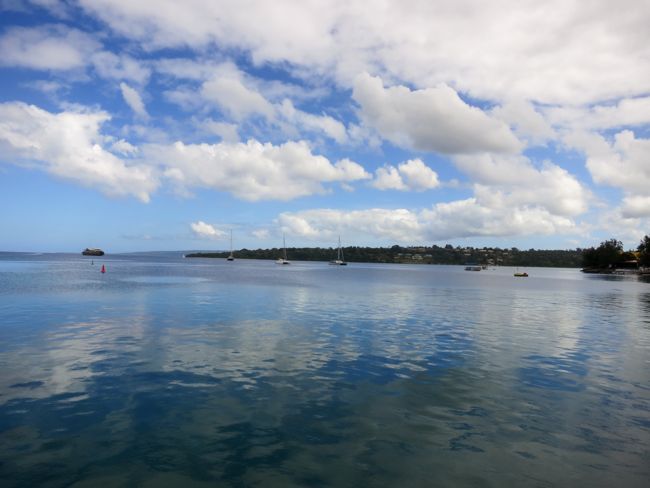
In 2006 the New Economics Foundation ranked Vanuatu #1 in their Happy Planet Index, and Vanuatu still markets itself as ‘the Happiest Place on Earth’. We saw it on benches, and locals mentioned it, giving different reasons for their happiness. “With weather like this, of course we’re the happiest country on earth.” “It’s the kava – relaxing with it every evening keeps us happy.” “Ever since the first missionary came, we’ve been happy.” (I’m terrible. I said “yes, I heard he was given a very warm welcome“).
The HPI doesn’t really measure human happiness though – it measures the how happy we are in comparison to our impact on the environment. Really happy, but terrible impact? Poor score. Pretty happy, low impact? Good score. Vanuatu may be happy, but it’s environmental credentials are at risk. The islands can’t support a growing population and a Western lifestyle. Slash and burn agriculture is OK if you have a few people and lots of land to cycle through, but if you do it constantly in the same spot, it leads to soil degradation and erosion.
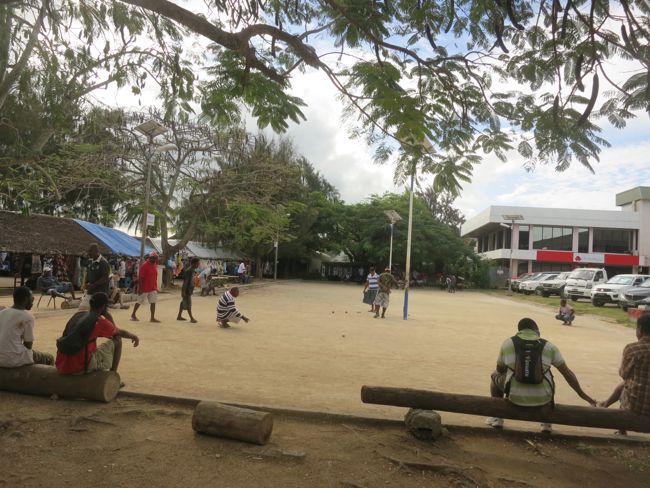 Petanque players on the waterfront in Port Vila
Petanque players on the waterfront in Port Vila
How will Vanuatu fare in the future, balancing the economy, environment, culture and heritage?
I don’t know.

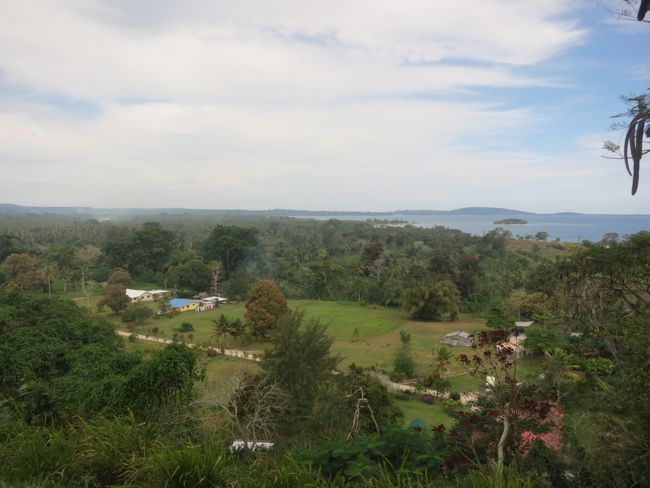
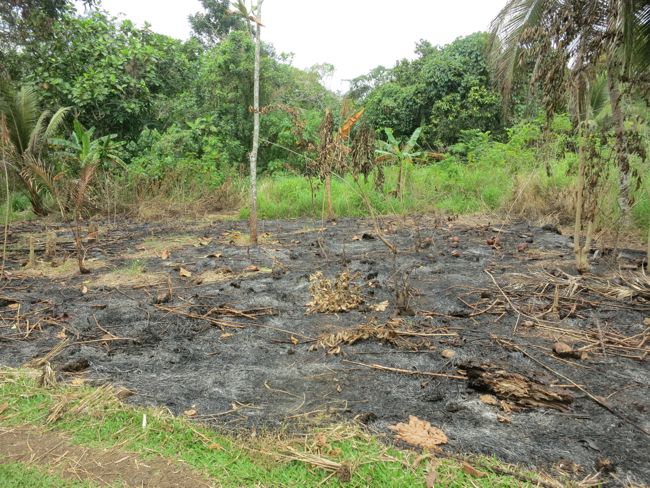


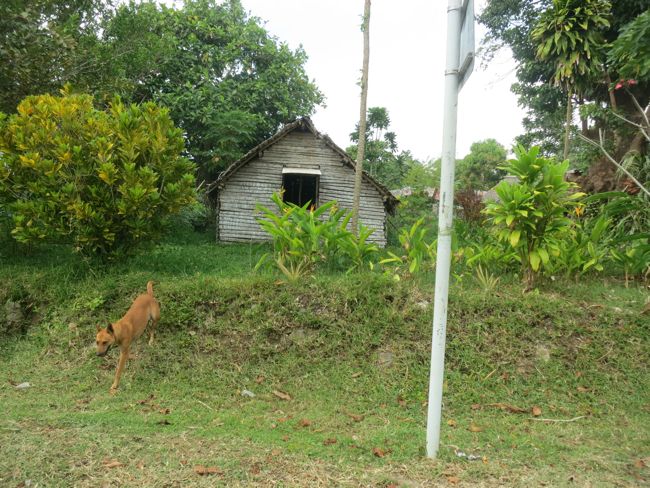
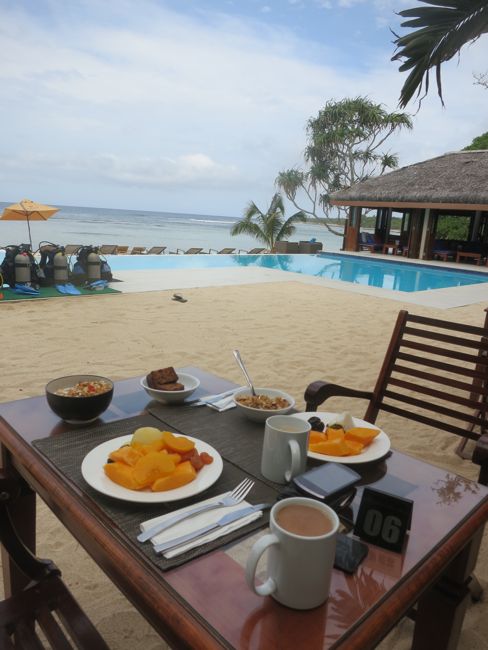
What a fascinating look at Vanuatu, Leimomi. Thank you so much for sharing! My first association with the island is “Happiest Place on Earth,” so it’s thought-provoking to see a more complete picture of the country, when I’ve not yet been myself.
This is exactly how I felt about visiting Fiji. Especially the dichotomy between the rich resorts and the poor locals.
You put it in much better words than I can.
And western money would cause just as much harm as good.
I went to Vanuatu a few years back. It was nice and the swimming was fantastic, but I didn’t feel right about being there. There I was chilling out on my rich white person’s holiday, while most of the locals were living in truly third world poverty.
I’m didn’t feel that I shouldn’t be there, and that tourism shouldn’t happen. On balance, talking to locals, we do more good than harm being there. And it probably does us good: to realise that kind of poverty is on our doorstep, and hopefully, to also see that life in Vanuatu, in many ways, isn’t to be pitied. But we could do a lot better.
Thank you for your article! I was doing voluntary health work on several of the Cook Islands about 10 years ago, and I felt exactly the same. Although it was good to be there and I had the impression our presence there was ok then (I am mainly thinking of smaller islands we visited, not the main island) you could only wonder what the future would bring. You pictures remind me very much of some of those small islands, that have not many sandy beaches but limestone cliffs and don’t attract many tourists. The question is, will it be possible to find the right balance. I have not been to the Cook Islands since and don’t know whether I ever will be again (it’s somewhat far away from Europe…), but I guess there have been tremendous changes especially to the main and pretty outer islands. I hope the balance can be kept by both sides – tourists handing out sweets… not responsible!
One of the coolest things about grad school at the University of Hawaii was that as a native English-speaker, I got to proofread so many fascinating theses and dissertations. One was written in 2008, on language documentation on Vanuatu. My friend spent months there–not on the resorts–but had the very same mixed feelings. I am very glad that she got there and was able to record what she did.
You are right on about Hawaii and how people help each other. Interestingly, the move from Hawaii to Germany was smooth, culture-shock-wise, as both countries value the social contract and the social safety net. The move from Germany to the Mainland was much rougher.
Thank you for the nuanced take on your vacation. Looks like you managed to have some fun, too!
I don’t know that I’d agree with you about sales pressure being against Melanesian culture. I grew up in PNG, and while the lowlanders tend to be quite laid back (often with very basic numbering systems) the highlanders tend to be very sharp businessmen indeed. Used car salesmen to a man, it has been said.
When in a city market in PNG, you need to keep your bag pressed closed so someone doesn’t slip something into it and then demand you pay.
That said, cities themselves are against Melanesian culture. Once you leave the village, you can’t live off the land, and your extended family can’t be there for you – and that’s when things turn to custard.
I definitely agree with you about health, education and women’s rights, though! And corruption, alas.
Wow–Papua New Guinea. You must have such neato stories!
Well, everywhere’s exotic to somewhere else 🙂
Very true!
I live in a very touristy town in rural Nepal. I’m sure you know that Nepal is one of the poorest countries in the world, tourism is the primary source of income here.
It’s funny you mention the tourists handing out candy to the native children. You don’t really see that many overweight Nepali children (or adults). You can tell where the most tourists have been handing out lollies & sweets to the kids – the incidence of dental disease in the children receiving the most candy skyrockets compared to children in places less frequented by tourists.
Exactly! Poor children. What do you do in Nepal?
(Dreamstress, why do you have such cool readers?)
Elise,
I have an art gallery specializing in Buddhist art.
Sometime in the late fall or early spring I organize a trek for health care workers to hold low cost health ‘clinics’. Usually we have a dentist or 2 along who is amazed at how few cavities the children in less touristy villages suffer compared to the ‘touristy’ villages. The availability of Coca Cola, & Snickers bars in larger villages isn’t helping either.
Thank you for what you do–it is so lovely of you to organise that care for others.